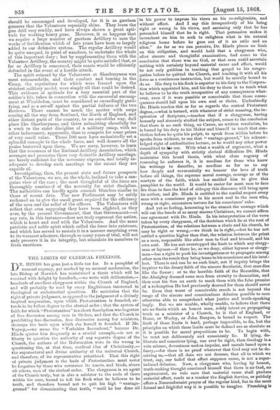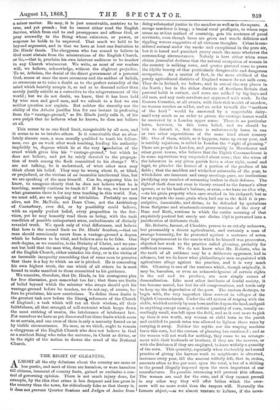THE LIMITS OF CLERICAL FREEDOM.
DR. HINDS has gone just a little too far. In a pamphlet of unusual cogency, yet marked by an unusual moderation, the late Bishop of Norwich has maintained a thesis which will be received with delight by hundreds,—we write with deliberation,— hundreds of excellent clergymen within the Church of England, and will probably .be read by every Englishman interested in theological or ecclesiastical questions. He maintains that the right of private judgment, as opposed to the judgment of a divinely inspired corporation, upon which .Protestantism is founded, ex- tends in its fullest degree to the clerical order ; that the system of faith for which "Protestantism" is a short description was begotten of free discussion among men in Orders, and that the Church in prohibiting free discussion, free discussion among her ministers, destroys the basis upon which she herself is founded. If Mr. Voysey,—we name the "Yorkshire Incumbent," because Dr. Hinds quotes him frequently as a crucial example, —is not at liberty to question the authority of any separate dogma of the Church, the authors of the Reformation were in the wrong in questioning the, at that time, cardinal idea of Christianity,— the supernatural and divine authority of the universal Church, and therefore, of its representative priesthood. That this right of private judgment is the basis of Protestantism must never be forgotten by those who reverence its tenets, and binds, above all others, men of the clerical order. The clergyman is an agent of the Church truly, but is also a minister to the souls of those within his cure, bound to tell his flock what he believes to be truth, and therefore bound not to quit his high " vantage- ground " for disseminating that truth, "until he has done all in his power to impress his views on his co-religionists, and without effect. And I say this irrespectively of his being right or wrong in his views, and assuming only that he has persuaded himself that he is right. That persuasion makes it incumbent on him to seek to enlighten what is his natural religious home before he goes out of it an exile and an alien." As far as we can perceive, Dr. Hinds places no limit on this obligation, and would hold that a clergyman who, after sincere and thoughtful examination, had come to the conclusion that there was no God, or that man could ascertain nothing with certainty beyond material cause and effect, would be not only guiltless in teaching that gospel to his congre- gation before he quitted the Church, and teaching it with all his force as a continuous instruction, but would be morally bound to do so. His duty to his flock is superior to his duty to the Corpora- tion which appointed him, and his duty to them is to teach what he believes to be the truth irrespective of any consequences what- ever, even if it were possible or conceivable that those conse- quences should fall upon his own soul or theirs. Undoubtedly Dr. Hinds teaches this as far as regards the central Protestant dogma,—what is termed, with whatever of strict meaning, the in- spiration of Scripture,—teaches that if a clergyman, having honestly and sincerely studied the subject, conies to the conclusion that there is no such thing, no Canon, no written revelation, he is bound by his duty to his Maker and himself to teach that con- viction before he quits his pulpit, to speak from within before he speaks from without, to use that "vantage-ground," his acknow- ledged right of authoritative lecture, as he would any other power committed to his use. With what a wealth of argument, what a depth of sympathy with strictly clerical difficulties Dr. Hinds maintains this broad thesis, with what close cogency of reasoning he enforces it, it is needless for those who know his writings to describe, as needless as for us to say how deeply and reverentially we honour the love of truth before all things, the supreme moral courage, courage as of the martyrs of the faith, which has enabled him to give this pamphlet to the world. It would be easier for most men to face fire than to face the kind of obloquy this discourse will bring upon its author, and Dr. Hinds is entitled to the cordial respect every man with a conscience pays in his secret soul to the man who, wrong or right, encounters torture for his conscience' sake.
And yet so feeling, honouring to the utmost the courage which will cut the bonds of so many sincere Christians, we cannot affirm our agreement with Dr. Hinds. In his interpretation of the vows taken by every clergyman, of the doctrines which lie at the root of Protestantism, of the relations between a cleric and his church, he may be right or wrong,—we think he is right,—but he has not settled a question higher than that, the relation between the priest as a man, responsible like other men to God and himself, and his own soul. He has not overstepped the limit to which any clergy- man or layman—if there be, as we deny, either layman or clergy- man—has a right to push his investigations or to propagate among other men the result they bring home to his conscience and his intel- lect. There is and can be no such limit, not if inquiry brings the inquirer to the dreary faith of the sincere Secularist, that man dies like the flower ; or to the horrible faith of the Recordite, that the Almighty doomed some men from eternity to damnation, and then sent his Son on earth to mock them with the false promise of a redemption He had previously decreed for them should never be. Even that worst of conceivable creeds is not beyond the range of the sincere and conscientious delusion possible to men otherwise able to comprehend what justice and truth-speaking imply. But we are unable, wholly unable, to believe that there are no limits which an honest man, solely intent on propagating truth as a minister of a Church, be it that of England, or Rome, or Wesley, or John Bunyan, is bound to respect. The limit of those limits is hard, perhaps impossible, to fix, but the principles on which those limits must be defined are as absolute as it is possible for moral propositions to be. To begin with, he must not deliberately and consciously lie. If lying, de- liberate and conscious lying, can ever be right, then theology is a vain science, devoutness useless impulse, and morals based upon a fancy,—for there is no proof whatever that God may not be de- ceiving us,—that all data are not dreams, that all to which we trust, say, our belief that effect supposes cause, is not a super- induced delusion. Now, a clergyman who, having by honest, truth-seeking thought convinced himself that there is no God, no supernatural, no rule save that material cause shall produce material effect, reads as a teacher the English Service, or publicly offers a Nonconformist prayer of the regular kind, lies in the most formal and frightful way it is possible to imagine. Preaching is
a minor matter. He may, it is just conceivable, contrive to be true, and yet preach ; but he cannot either read the English Service, which from end to end presupposes and affirms God, or pray avowedly to the Being whose existence, or power, or response he holds to be unproved. That much we hold to be beyond argument, and in that we have at least one limitation to Dr. Hinds' thesis. The clergyman who has ceased to believe in God must abstain from the ministrations of the English Church, or lie,—that is, proclaim his own inherent unfitness to be teacher in any Church whatsoever. We write, as most of our readers will, we believe, acknowledge, without the slightest prejudice. To us, Atheism, the denial of the direct government of a personal God, seems at once the most erroneous and the saddest of beliefs, so erroneous as to raise a doubt as to the perfect rotundity of the mind which heartily accepts it, so sad as to demand rather than merely justify suicide as a corrective to the misgovernment of the world ; but we do not doubt, we know, that it has been held by wise men and good men, and we submit to a fact we can neither question nor explain. But neither the sincerity nor the ability of the Atheist justifies him for one instant in professing from the "vantage-ground," as Dr. Hinds justly calls it, of his own pulpit that he believes what he knows, he does not believe at all.
This seems to us one fixed limit, recognizable by all men, and it seems to us to involve others. Is it conceivable that an abso- lutely sincere man, a man morally qualified to teach his fellow- men, can go on week after week teaching, lending his authority implicitly to, dogmas which lie at the very foundation of the creed which gives him his "vantage-ground," but which he .does not believe, and yet be solely devoted to the propaga- tion of truth among the flock committed to his charge ? We are not talking, be it understood, of what other men may -think about his belief. They may be wrong about it, or blind, -or prejudiced, or the victims of an incurable intellectual bias, but we are speaking of the man himself. Can he, supposing him to know, to recognize clearly that he does not believe what he is teaching, morally continue to teach it? If he can, we know not -what guarantee there is for any true teaching in this world. Nor, -we must add, are we speaking of trivialities. Probably no man -alive, not Dr. McNeile, not Dean Close, not the Archbishop -of Canterbury, ever did, or by possibility could believe, with an equally perfect belief, every proposition in the Ser- vices, yet he may honestly read them as being, with the tacit -condition of possible unimportant error, embodiments of divinely revealed truth. We speak only of vital differences, and believe that here is the second limit on Dr. Hinds' freedom,—that no man should consciously assert from a vantage-ground a dogma which he believes to be vital, and believes also to be false. One -such dogma, as we conceive, is the Divinity of Christ, and we can- not but hold that the man who, denying that, remains a minister -of the English Church, either mistakes his duty, or is the victim of an incurable incapacity resembling that of some men to perceive that there is a key to which an air is pitched. He is concealing his own highest truth, the one which of all others be is most bound to make manifest to those committed to his guidance.
We conceive, therefore, that Dr. Hinds, in his courageous plea for free discussion, goes somewhat too far ; that there are limits -of belief beyond which the minister who strays should quit his vantage-ground before he teaches, we do not say, of course, be- fore he proclaims, his new convictions. To define those limits is the greatest task now before the liberal, reformers of the Church -of England ; a task which will tax all their wisdom, all their faithfulness, all that strength of self-restraint which keeps down the most enticing of snares, the intolerance of intolerant law. For ourselves we have as yet discovered but three limits which seem to uS certain, and one even of them is only a necessity forced on us by visible circumstances. No man, as we think, ought to remain a clergyman of the English Church who does not believe in God as a sentient Being who rules the universe, in Christ as divine, or in the right of the nation to decree the creed of the National 'Church.































 Previous page
Previous page